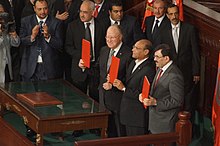Mustafa Ben Jaafar
Mustafa Ben Jaafar ( Arabic مصطفى بن جعفر Mustafa b. Jafar , DMG Muṣṭafā b. Ǧaʿfar ; * 8. December 1940 in Tunis ) is a Tunisian politician. He is the founder and general secretary of the social democratic democratic forum for work and freedom (“Ettakatol” or FDTL). From November 22, 2011 to December 2, 2014, he was President of the Constituent Assembly formedafter the 2011 election and is considered the "father" of the new Tunisian constitution that was passed in January 2014.
Ben Jaafar attended the Collège Sadiki from 1950 to 1956 , which trained the future elite of the country in bilingual classes according to the values of the Enlightenment and modernity . He then studied radiology in France.
In 1978 he joined the Socialist Democratic Movement (MDS) and became its general secretary in 1992. Two years later he founded the FDTL. In 2009 he applied for the presidential election in Tunisia in 2009 , from which he was excluded.
During the 2010/2011 revolution , Mohamed Ghannouchi appointed him health minister in the Tunisian interim government on January 17, 2011 , from which he resigned on January 27 in protest against the dominance of the former ruling party, the Constitutional Democratic Collection (RCD), and Habiba Zéhi was replaced.

After the election to the Constituent Assembly of Tunisia in 2011, he was elected chairman at its first meeting on November 22nd. He was an important actor in the drafting of the post-revolutionary and democratic constitution of Tunisia.
He did not succeed in gaining political capital from his prominent position. As part of the “Troika” government under the leadership of the Islamic Ennahda movement in the Constituent Assembly (2011 until his resignation at the end of 2013), his party was wiped out between the polarized fronts; ten out of 20 MPs left the party before the parliamentary elections on October 26, 2014 . In the election, his party was no longer given a seat and therefore left the parliamentary process after the end of the Constituent Assembly on December 2, 2014 with the constitution of the new Tunisian parliament .
Ben Jaafar ran for the presidential election in Tunisia in 2014 , but achieved only 0.67 percent (21,989 votes) in the first round on November 23, 2014 and came tenth out of 27 applicants. In the election campaign, he reproached the family-networked favorite and winner, El Sebsi, of striving for the hegemonicism of a one-party government (“taghawel”).
Web links
- Edit Kresta: "Tunisia will change the world". Politicians on Tunisian situation. In: the daily newspaper , February 12, 2012 (interview with Ben Jaafar on the political situation after the 2010/2011 revolution).
- Gianluca Wallisch: “It will be a constitution for all Tunisians”. In: Der Standard , September 4, 2012 (interview with Ben Jaafar on the drafting of Tunisia's new constitution).
Individual evidence
- ^ A b Joachim Paul: The Tunisian parliamentary elections: An overview of the most important parties. In: Heinrich Böll Foundation (website), October 21, 2014.
- ↑ Le premier Parlement tunisien post-révolutionnaire fait sa rentrée. ( Memento of the original from December 9, 2014 in the Internet Archive ) Info: The archive link was inserted automatically and has not yet been checked. Please check the original and archive link according to the instructions and then remove this notice. In: France 24 , December 2, 2014.
- ^ Tunisie: l'Assemblée des représentants du peuple a pris ses fonctions. In: Radio France Internationale , December 3, 2014.
- ↑ 27 candidates admitted to the Tunisian presidential election. ( Memento from October 11, 2014 in the Internet Archive ) In: stol.it , September 30, 2014; see also Michel Abu Najm: Mustafa Ben Jaafar: Being a consensus presidential candidate “would be an honor”. In: Asharq al-Awsat , June 27, 2014.
- ↑ Ben Jaafar-Caïd Essebsi: pourquoi tant de haine? In: Leaders.com.tn , December 2, 2014.
| personal data | |
|---|---|
| SURNAME | Ben Jaafar, Mustafa |
| ALTERNATIVE NAMES | مصطفى بن جعفر (Arabic) |
| BRIEF DESCRIPTION | Tunisian politician (MDS) |
| DATE OF BIRTH | December 8, 1940 |
| PLACE OF BIRTH | Tunis |

